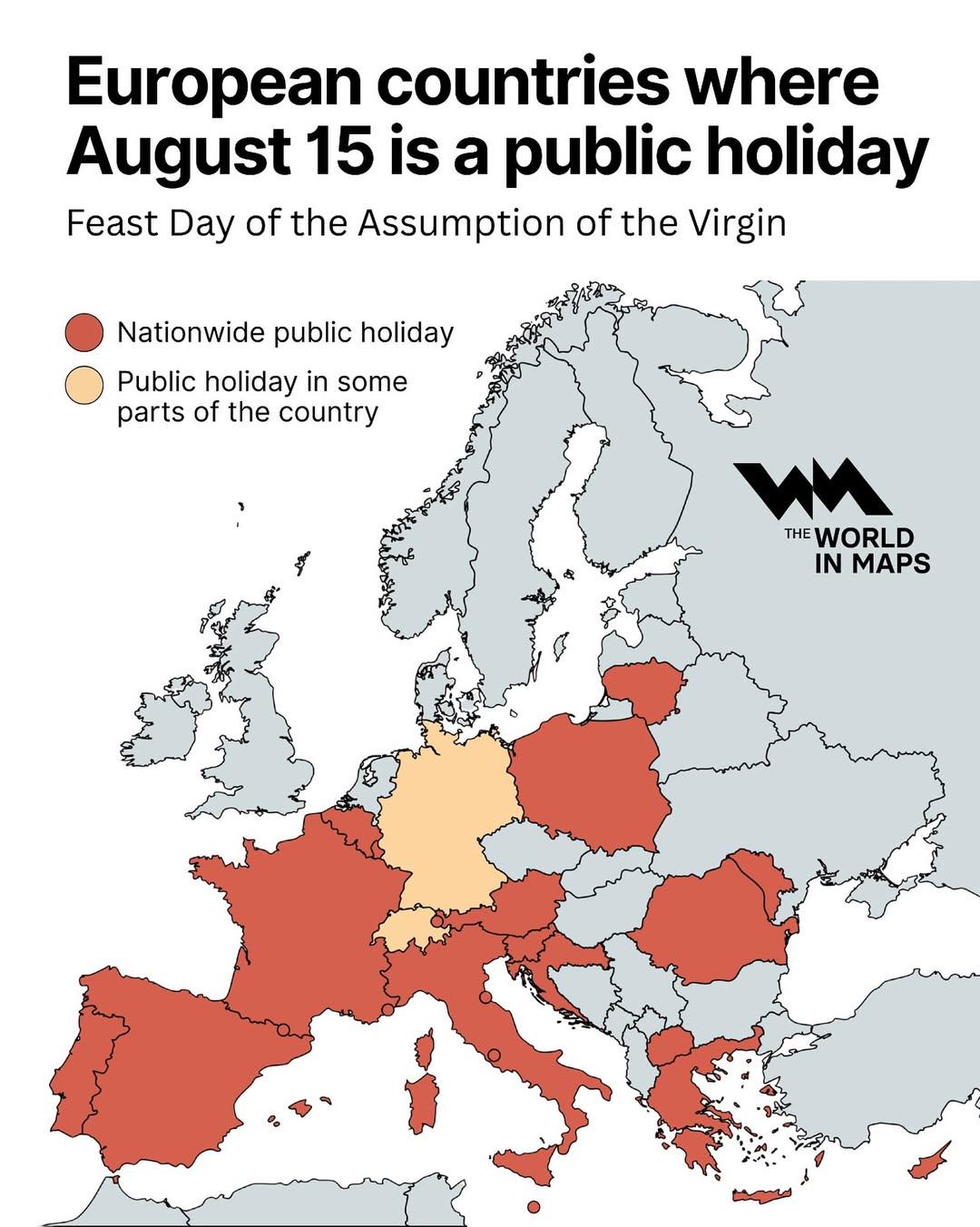Public Holiday Map of Europe on August 15


David Chen
Data Visualization Specialist
David Chen is an expert in transforming complex geographic datasets into compelling visual narratives. He combines his background in computer science ...
Geographic Analysis
What This Map Shows
The visualization titled "European countries where August 15 is a public holiday" provides a clear and informative overview of which nations in Europe observe this specific day as a public holiday. This map serves as a useful tool for understanding cultural and historical significance across different countries, showcasing how national observances are interwoven with national identity and tradition.
August 15 holds particular importance in several European nations, often celebrated as a day of religious and cultural significance. For instance, this day is recognized as the Feast of the Assumption in many predominantly Catholic countries, marking the assumption of the Virgin Mary into heaven.
Deep Dive into August 15 Observances
August 15 is not just an ordinary date on the calendar; it’s steeped in religious and cultural significance for many countries. The Feast of the Assumption, celebrated on this day, is a major event in Catholicism and is marked by various traditions, including processions and church services. Countries such as Italy, France, and Spain observe this holiday with great reverence, reflecting their deep-rooted Catholic heritage.
Interestingly, Italy has a rich tapestry of traditions associated with Ferragosto, as August 15 is commonly known there. This holiday not only marks the Feast of the Assumption but also symbolizes the height of summer. Many Italians take this opportunity to escape the city and head to coastal areas for vacation. The day is often filled with family gatherings, feasting, and various festivities, making it a vibrant celebration.
In France, the day is also a public holiday, with many people attending mass in honor of the Virgin Mary. The picturesque towns and cities may host fairs and events that draw locals and tourists alike. Have you ever participated in such a local festival? It’s a unique way to experience the culture.
In contrast, some countries do not officially recognize August 15 as a public holiday despite its significance. For example, in Germany, while the day holds some cultural importance, it is not a nationwide public holiday. Instead, various regions may celebrate it differently, leading to a diverse spectrum of observances.
Additionally, the significance of this date can extend beyond religious observance. In countries like India, August 15 is celebrated as Independence Day, marking the end of British colonial rule. While not directly related to the Feast of the Assumption, this overlapping observance highlights the varied meanings that a single date can hold across different cultures.
Regional Analysis
Looking at the map, we can see a clear division in how different regions in Europe approach August 15. Southern European countries, particularly Mediterranean ones like Italy, Spain, and Greece, are more likely to observe this day as a public holiday rooted in Catholic tradition. These nations often incorporate local customs and celebrations, making the day a blend of religious reverence and cultural festivities.
Northern European countries, on the other hand, tend to have fewer public holidays surrounding this date. For instance, in Scandinavia, August 15 does not hold the same significance, and many businesses operate as usual. Interestingly, this discrepancy can be attributed to varying religious influences and cultural practices. In countries like Sweden and Denmark, where Lutheranism is predominant, the observance of the Feast of the Assumption is less pronounced.
Eastern European countries present another layer of complexity. Nations like Poland celebrate this day as a public holiday, with significant religious observance. Conversely, countries that have undergone historical shifts, such as the Czech Republic, do not recognize it as a public holiday, revealing the impact of socio-political changes on cultural observances.
Significance and Impact
Understanding which countries in Europe recognize August 15 as a public holiday illuminates broader cultural and historical narratives. These observances are not just about taking a day off work; they reflect the values, traditions, and historical legacies that shape national identities. As societies evolve, the importance of these holidays can change, influenced by factors such as globalization, secularization, and demographic shifts.
Interestingly, as Europe becomes increasingly diverse, the observance of traditional holidays may also adapt. Countries with significant immigrant populations may see August 15 celebrated in various ways, blending different cultural practices. This evolution poses questions about cultural preservation and adaptation in an interconnected world.
In conclusion, the map of European countries where August 15 is a public holiday serves as a valuable reflection of the continent’s rich cultural tapestry. It invites us to consider how historical events, religious beliefs, and national identities shape the way we observe time and celebrate our shared heritage. As we look to the future, understanding these patterns will be crucial in navigating the complexities of cultural identity in an ever-changing landscape.
Visualization Details
- Published
- August 15, 2025
- Views
- 96
Comments
Loading comments...